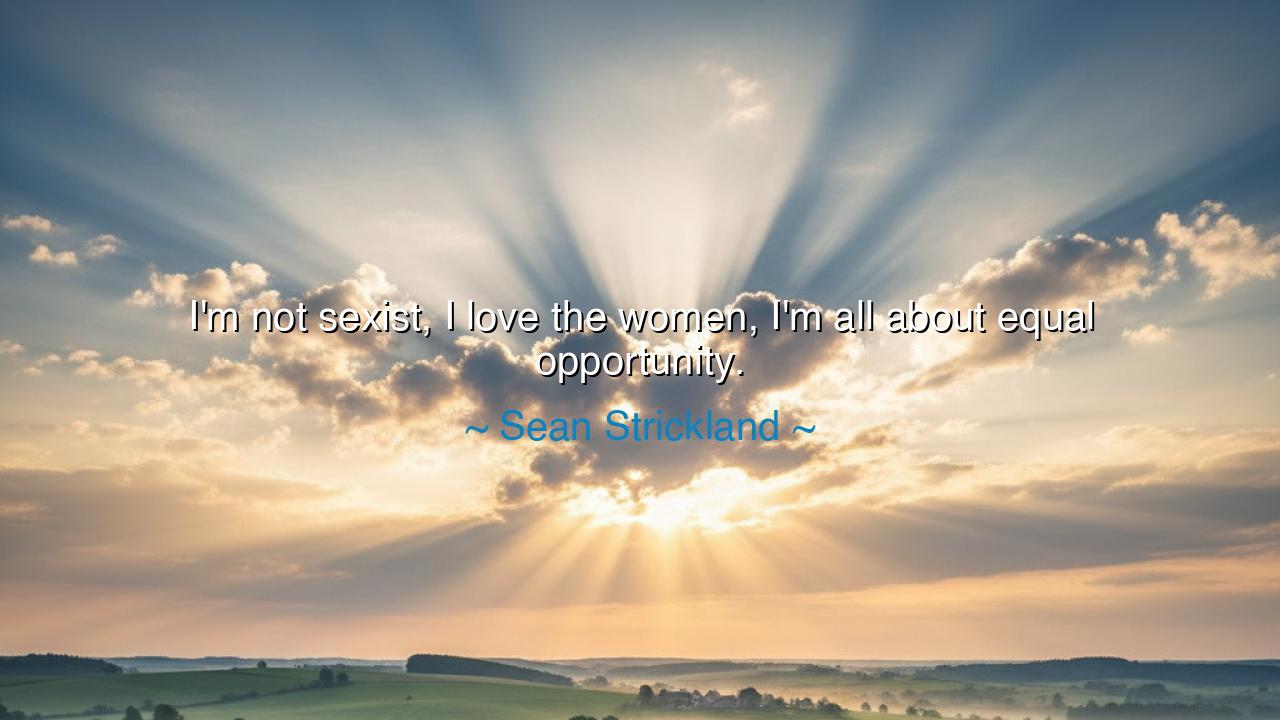
I'm not sexist, I love the women, I'm all about equal






The words of Sean Strickland, “I’m not sexist, I love the women, I’m all about equal opportunity,” strike with the bluntness of a warrior’s tongue. Beneath their rough edge lies a truth both simple and eternal—that dignity is not measured by sex, but by the strength and will of the individual. He rejects the ancient chains of prejudice, proclaiming that all should stand upon the same ground of trial and honor, judged not by birth but by deed.
This sentiment echoes back through time. In the legends of Sparta, women were trained not to hide in silence but to be strong, to bear words as sharp as spears, and to uphold the city’s greatness alongside men. Their worth was not diminished by sex, but exalted by opportunity. And so Strickland, in his own rough manner, channels the same conviction: that a contest is only just when all may enter the field, whether man or woman, without barrier save their own courage.
In our more recent history, one remembers Billie Jean King, who in 1973 stepped onto the tennis court to face Bobby Riggs in the “Battle of the Sexes.” The world laughed and doubted, for Riggs boasted that no woman could defeat him. Yet she triumphed, not merely in sport but in symbolism, showing millions that equal opportunity was no idle phrase but a living power. Strickland’s words, though delivered with less grace, spring from the same well—that respect is proven in combat, in competition, in recognition of another’s strength.
Yet there is irony in his declaration. For to say “I love the women” is also to reveal how easily affection may be mistaken for respect. True equality lies not in fondness but in recognition of shared humanity, of the same fire that burns in all souls. The danger is that love may be used as a shield, while the deeper duty of justice remains unfulfilled. Still, his insistence on equal opportunity proclaims a vision that the ancients themselves would have honored: that the worth of a person lies in their deeds, not in the chains placed upon them by tradition.
So let the generations remember: equality is not granted through sentiment, nor through indulgence, but through the open gate, the level field, the fair contest. Whether in the arena, the workshop, or the council hall, let no one be denied the chance to rise. For when both men and women stand shoulder to shoulder, tested by the same trials, the strength of a people becomes unbreakable.






Ddtan
Sean Strickland’s comment about loving women and supporting equal opportunity is often heard from people trying to convey progressive values, but how genuine is it? Saying 'I'm not sexist' doesn’t automatically guarantee equality in practice. What does Strickland’s position on women’s rights actually look like beyond this statement? Shouldn't actions like equal pay, respect in all spheres, and breaking down gender barriers be the focus of his advocacy?
GDGold D.dragon
It’s interesting that Sean Strickland claims to love women and support equal opportunity. However, we must ask: Is the idea of 'loving women' just an expression of respect, or does it come with assumptions that might undermine the message? True support for equal opportunity requires more than just words—it requires consistent actions that challenge outdated gender norms. How do we ensure that expressions of support go beyond superficial statements and actually lead to meaningful change?
BVDoan Ha Bao Vy
Strickland’s declaration that he's not sexist and supports equal opportunity is positive, but the language he uses makes me wonder if he fully understands the complexities of gender equality. While claiming to love women sounds good, how do his views and actions translate into real-world equality? Is it enough to say these things, or do we need to see deeper, more consistent actions that truly support equal opportunities for women in all aspects of life?
HDHong Diem
While Sean Strickland says he is 'all about equal opportunity,' it’s worth considering how his actions align with these words. Equal opportunity isn’t just about a statement; it’s about creating tangible change in systems where inequality still exists. Does his behavior reflect a true commitment to equal opportunity, or is this statement more of a surface-level assertion? What does equal opportunity look like in practice, especially in environments like sports or entertainment?
TNNguyen Trong Nhan
Sean Strickland’s quote about loving women and supporting equal opportunity seems like an attempt to express a progressive stance. However, the phrasing of 'I love the women' can come across as problematic, as it may unintentionally reinforce stereotypical views or objectify women. Is it possible to advocate for equality without resorting to language that can perpetuate a sense of superiority or condescension? How can we balance expressing support without falling into old tropes?